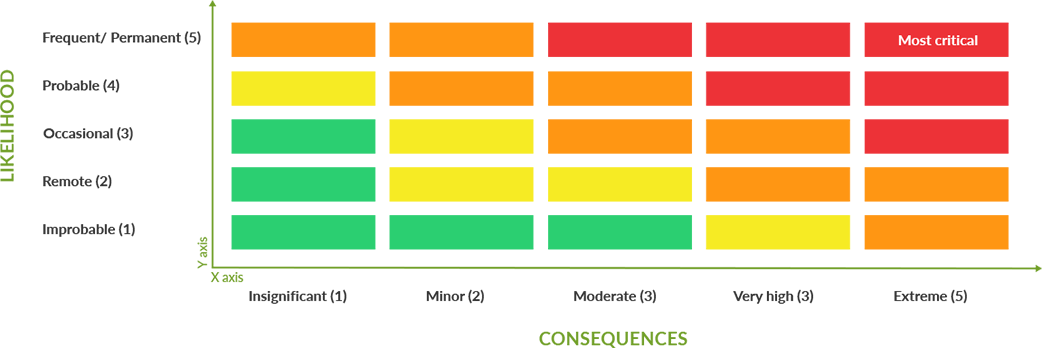Risk Management
Sustainable business requires risks to be proactively and promptly managed before they start damaging the company’s performance.
Risk Management is an integral part of business management and is the practice of systematically identifying, understanding and assessing risks, and the controls to manage them.

Risk Assessment Process
Birla Cellulose determines priorities concerning risks and opportunities based on the assessment and combined analysis of likelihood and impact.
-
Identification
-
Evaluation Assesment
-
Communication
Likelihood has 5 levels:
- Improbable (Almost impossible to occur in the next 10 years)
- Remote (May occur once or twice in the next 10 years)
- occasional (May occur more than twice in the next 10 years)
- probable (Likely to occur at least once every year in the next 10 years OR continues once every year after one occurrence)
- frequent/permanent (More than once a year over the next 10 years OR permanently continues or occurs more than once every year after once occurence)
Consequences are defined as:
- insignificant
- Minor
- Moderate
- Very High
- Extreme
On a Heat Map, assessed risks and opportunities are mapped, which determines the different levels of priorities the company will take to mitigate risks & enhance opportunities, including for climate change. All the risks are coded, categorized which are then reported, risks are assigned to owners & a mitigation plan is prepared for each identified risk with high occurrence probability. Based on the heat map, inherent risk is calculated & mitigation plan is prepared, post which residual risk is calculated.
Sustainability Cell reviews the risks every quarter and reassess the risks based on actions taken against a particular risk; in the event of any changes, the risk is re-evaluated and updates are made to risk register or risk matrix.

Risks Identified
Below are some risks identified for our Business
Wood is the most important raw material for Birla Cellulose and there is limited supply of sustainably sourced wood. Forests, especially the ancient and endangered forests, house majority of the biodiversity and sequester carbon to fight global warming, loss of forests can be a serious risk to biodiversity and global warming and needs to be addressed effectively. Birla Cellulose Wood Sourcing Policy is implemented to address this risk and ensures wood is sourced from sustainably managed forestry practices, protecting and conserving the ancient and endangered forests. Prioritizing development of alternate raw materials, such as pre- and post-consumer waste and agri-waste will reduce our reliance on virgin wood.
Millions of people are at risk globally from water scarcity and pollution. The need to protect and restore freshwater ecosystems and to seize the potential of sustainable and efficient management of water, has never been greater. Birla Cellulose understands that water is a key resource and over the years, it has adopted ‘4R’ (Reduce, Recycle, Reuse & Regenerate) principle for protecting and conserving water resources through excellent water management practices and it is integral part of its commitment towards water stewardship.
Climate change is leading to several natural calamities or weather events that may affect our operations, especially in countries of high water stress. Some of the impacts of climate change are water availability and droughts due to shifting rainfall patterns, forest fires leading to deforestation of existing forests and can reduce access to wood, floods due to uncontrolled rains, irregular monsoons, cyclones / storms as a result of changing wind patterns, crop failure etc. Use of coal will become expensive due to green cess or carbon tax. GHG reduction would be mandated by regulators. Availability and cost of renewable energy is improving gradually as new innovations make renewable energy more feasible. Climate related risks are tabulated in below table:
| Current and emerging regulation, legal and policy related risks |
Climate change related regulations are continually evolving and governments are promoting renewable energy and discourage use of thermal energy, putting limits on water usage can pose a risk to the businesses. GHG emissions reduction is also being mandated by regulators with direct or indirect taxes on thermal energy. Birla Cellulose has a proactive approach in engaging with regulators to understand upcoming regulations and plan for it proactively. We review our systems periodically to align to the changing local, national and global regulatory framework and disclosure requirements. |
| Technology |
New technologies for renewable energy, energy efficient equipment, circular business models are continually being developed and not adapting these can lead to technology obsolesce. Birla Cellulose invests strongly on technology development and evaluates and adapts the best available technologies in its operations including technologies required for low carbon economy and replace the old technology. |
| Market |
Consumer preference is changing and there is more demand for low-carbon products. Also supply and demand of certain materials can change due to climate changes. Birla Cellulose continually monitor this and especially the role of forests in fighting the climate change, and is investing in low carbon products. |
| Reputation |
Reputation risk may result in loss of investors, customers, value chain partners if an organization is not transitioning to low carbon economy. Birla Cellulose roadmap is aligned to the expectations of stakeholders w.r.t climate change and it takes inputs from leading organizations to shape its polices. |
| Acute physical |
Extreme weather events such as floods, storms, heatwaves are external factors and have no control on it can pose to the operations in certain geographies. These risks are evaluated for each site and risks scenarios are available to handle and mitigate impacts of natural calamities. In such cases, site management updates the customers regarding delays in supply. The emergency response plans of the site address possible scenarios applicable to the site. |
| Chronic physical |
Climate Change may result in long term shift of climate pattern such as rainfall pattern, sea level changes and heat waves. Birla Cellulose rely on surface water for its operations and inadequate supply can impact on operations. Birla Cellulose has aggressively reduced its water consumption and continues to further reduce its water needs. Also rain water harvesting and storage augmentation has been done. |
Consumers are driving force for global fashion industry. Awareness towards pollution by fashion industry, circularity and climate change and its ill effects is taking a major share of headspace of consumers, so a change in preferences of consumers is a risk. Birla Cellulose strategy is to lead in sustainable practices and convert this risk to opportunity to participate in increased demand of sustainable product. Birla Cellulose business strategy incorporates the sustainability best practices applied in its operations and across the supply chain to cover the customers’ expectations. Birla Spunshades, Birla Excel, Livaeco™, Liva Reviva are some of the examples. Life-cycle assessment (LCA) methodology is used to understand and improve the products.
There is an increasing demand by consumers and stakeholders for increasing the visibility of sustainability credentials of entire supply chain of products. Any non-compliant partners in supply chain is a big risk to reputation and business. For example, a MMCF made using wood sourced from endangered forests can lead to quick kill of reputation of any brand beyond repair and can result in loss of business. Birla Cellulose addresses this risk to provide complete transparency of its value chain from forest to fashion, using advanced Blockchain based solution and requires all major suppliers to implement its Supplier Code of Conduct.
There is increasing requirements from the external stakeholders such as customers, not-for-profit organizations, government, investors to transparently report our performance on environmental, social, governance, compliance, and a multitude of other issues. Social media influence also plays a major role in quickly mobilizing the consumers towards such issues. Birla Cellulose is disclosing the performance through GRI based reporting, ZDHC platforms, SAC Higg FEM platform, and Birla Cellulose website contains important policies, performance, audit reports, certifications and many documents related to sustainability aspects of the business.
Right to operate in a particular geography requires to follow the law of the land and all the regulatory compliances. Any gaps in compliance or awareness of the local laws can lead to risks to carrying out business in that geographies. We have a system of tracking compliances through a tool ENHESA where the regulatory framework of region and countries where we operate are mapped out and tracked. A series of internal and external audits are performed to ensure we comply to all the current legal requirements and capture any new requirements that may come in future.
Health and Safety of employees, workers, contractors, surrounding communities of an organization is of highest importance as incidents like fire, injuries, leakages, work related stress may pose a risk to them and also a growing concern among stakeholders. At Birla Cellulose, health & safety committee is in place and we have a well-defined roadmap to reach the goal of 'Zero Harm'. Regular monitoring of vital health parameters for all employees and contractors working in the facilities is being done. Further we have planned to achieve the EU BAT standards at all sites for sulfur emissions by 2022 which will reduce emissions of harmful gases in the environment.
Loss of reputation, can happen due to a several reasons and can put serious issues for the organization. A loss of reputation on any account would mean that customers, investors, regulators and other external stakeholders may quickly distance themselves from the company with soiled reputation. Birla Cellulose consistently monitors its sustainability performance by putting in place strong systems for governance with multi-level checks and internal and 3rd party audits. We have established mechanisms for grievance management and ensure to address them suitably. We engage closely with all stakeholders to improve communication and trust.
Failure to adapt new technologies can pose risk if company loses its competitive edge and technological leadership in the market. Birla Cellulose is among the leaders in the industry and its cutting edge technologies help it to maintain the leadership in market as well as sustainability best practices. Birla Cellulose is investing significantly in in R&D activities to develop new products and evaluate new technologies. It also collaborates with technology focused institutes and suppliers to continually upgrade its processes and products, so that it maintains its leadership in this area.
Communities are becoming more sensitive to environment and community impacts are being monitored and studied in more details than ever before. The expectations are for higher level of engagement and sharing of information and disclosures and also active feedback and grievance management, absence of which can create a negative sentiment that can have impact on site operations. Birla Cellulose has deep engagement with surrounding communities and community engagement is very closely embedded with its business values. Our community engagement programmes are focused on the upliftment of the community and partner in the overall development of the society.
In the backdrop of Covid-19, a new risk has emerged which has potential to disrupt not only businesses but the global economy. Covid-19 has impacted almost all the nations and led to a disruption in the business and life of the people. Covid-19 which started as an epidemic in China had soon turned to a pandemic. It was beyond imagination that Covid-19 could soon turn into a disaster for the economies and supply chains. Birla Cellulose has developed Business continuity plans where such scenarios are developed with clear mitigation plan to protect our employees, customers, surrounding community and stakeholders from such threats as well as actions that would facilitate safe operations of business units in such prolonged situations.
Risk Assessment
Sustainable business requires that the risks are managed proactively and promptly before they can start to damage the performance of the company.










